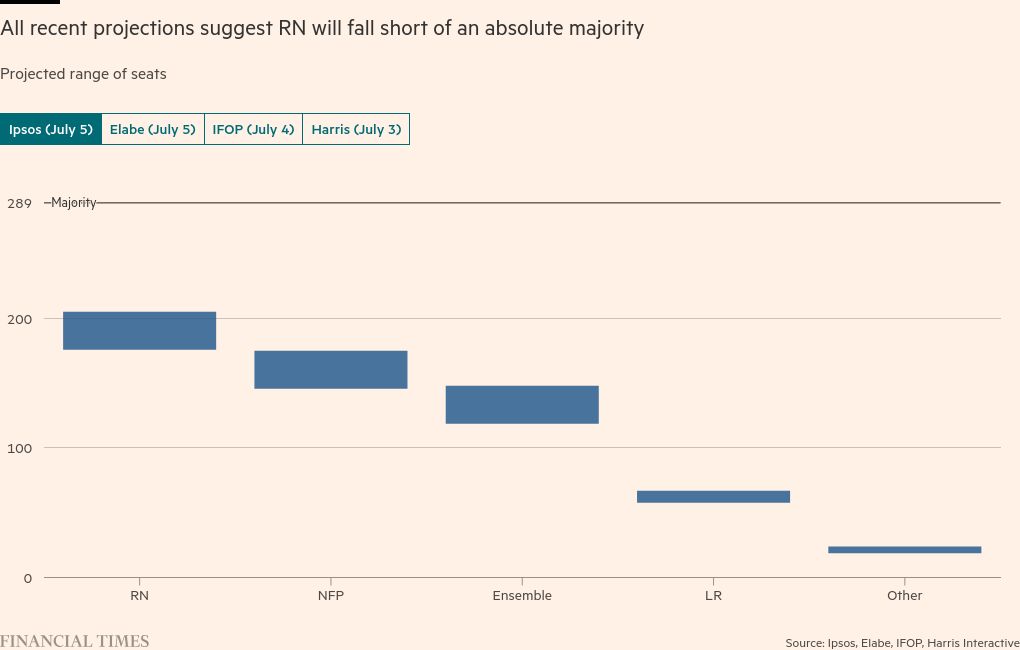
Unlock the Editor’s Digest for free
Roula Khalaf, Editor of the FT, selects her favourite stories in this weekly newsletter.
France is headed towards a hung parliament in high-stakes snap elections on Sunday, with the far right likely to fall short of the outright majority needed to form a government, according to Ipsos.
A survey published on Friday showed the far-right Rassemblement National (RN) and its allies would only secure between 175 and 205 seats in the 577-strong parliament. The projection, based on a sample of 10,000 people, shows a wider shortfall compared with other polls that came out earlier this week.
Ahead of the run-off on Sunday, the home stretch of the campaign was marked by tension as several campaigners were attacked, and 30,000 police prepared to be deployed on voting day.
Mathieu Gallard, a researcher at Ipsos, said the survey indicated that the strategy by President Emmanuel Macron’s centrist alliance and leftwing parties to pull out more than 200 candidates from three-way races on Sunday in order to consolidate the anti-RN vote was working.
The practice, called the front républicain, requires voters to hold their noses and vote for parties they do not usually support so as to block the RN.
“The front républicain held up surprisingly well in this poll, and concerns that people would not follow the advice given by national parties seems unfounded,” he told the Financial Times.

The RN campaign hit a rocky patch in recent days as some of its candidates appeared ill-informed in interviews while a handful of others were revealed to have posted racist or xenophobic content online. A first-time MP candidate in Normandy withdrew from the race when an old photo emerged of her wearing a Nazi cap.
The left-wing Nouveau Front Populaire (New Popular Front) bloc is on track to come in second with 145 to 175 seats, potentially just on the heels of the RN. The power dynamics within the left are also shifting: the previously dominant far-left La France Insoumise (LFI) led by anti-capitalist firebrand Jean-Luc Mélenchon may end up with 58 to 68 seats, just ahead of the centre-left Socialist party on 51 to 61.
Macron’s Ensemble alliance could secure 118 to 148 seats, according to Ipsos. This is down significantly from the roughly 250 it had in the last parliament, but not the complete wipeout once feared.
Pollsters warn that seat estimates are not an exact science. But Gallard said that if the projections were confirmed in the run-off, there was a distinct possibility that no party would be able to form a government.
“It will be very, very complicated for the parties,” he said. One possibility would be to try to forge a compromise from the centre-left to the centre-right to form a government, but given their wide policy disagreements, that may prove difficult.
Some analysts have said a technical government headed by a non-partisan expert might be the only solution to bridge the gap until new elections could be held in a year. France has never had such a government since the founding of the Fifth Republic in 1958.
With the risk of gridlock looming, some party chiefs have started sending signals about potentially working together. Prime minister Gabriel Attal has said a “pluralistic assembly” could craft agreements to pass specific policies.
But some leaders in the NFP have already started laying down conditions, such as calling for the repeal of Macron’s flagship pension reform.
Markets have been jittery in recent weeks about political instability in France since the country has heavy debts that have led to credit rating downgrades and the European Commission putting the country in an excessive deficit procedure.
Mujtaba Rahman, managing director for Europe at Eurasia group, said the French constitution did give a technical government “some important powers over tax and spend” but it would not have the legitimacy to take significant action to cut France’s wide deficits. “Political reality is likely to prove a very big constraint,” he said.
RN leader Marine Le Pen predicted there would be “a quagmire” if her party did not win an outright majority. “For a year the country will be at a standstill at the worst time for it.”